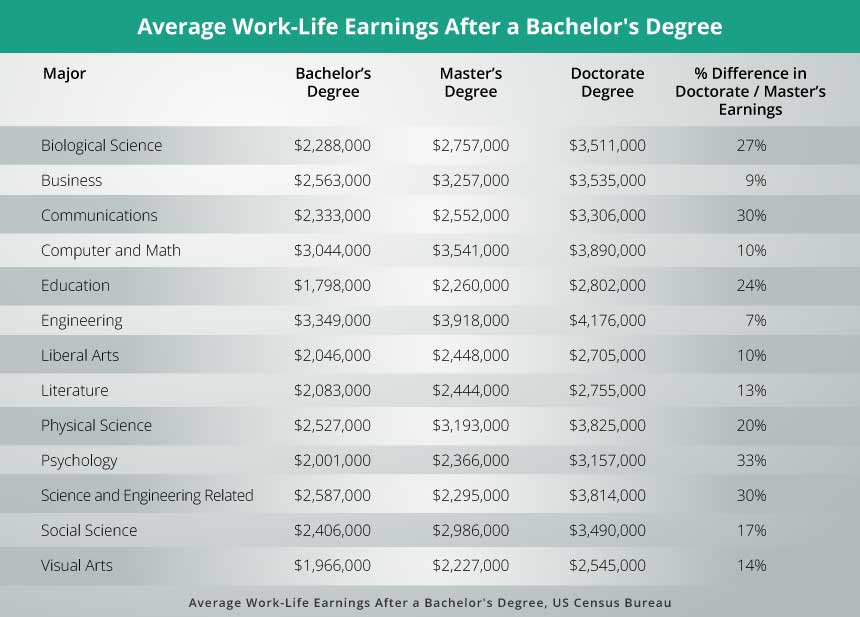Study after study has shown that earning a PhD will lead to higher earnings. Stick with us while we explore the exact amounts of salary boosts and deep dive into other PhD’s worths.
But, first, let’s quickly get one thing out of the way.
If you’re a PhD aspirant with gloomy enthusiasm in his eyes, you’ve probably turned to more experienced students with a myriad of questions. And indeed, this way of addressing some of the concerns can be quite helpful. But, be cautious, though. Learning from the experience of others can be a tricky thing.
Not everyone will have the same experience. Some will “suck out” all the benefits of a doctorate degree; others will drop out sooner than they expected. Likewise, even though job opportunities for PhD graduates are generally favourable, not everyone will be overwhelmed with offerings straight away.
In short, personal experience related to postgraduate studies can be packed with one too many variables.
So, let’s get down to numbers.
Establishing Facts: Does a PhD Earn You More Money?
First things first, the answer to our title question is definitively a resounding “yes” – PhD will earn you more money. Various research undertaken in recent years demonstrated that income is directly related to educational attainment. For example, some studies report a salary gap of 71% (between those with a first degree only and those with advanced education levels).
According to the US Bureau of Labor Statistics, doctorate holders will earn approximately $1.885 per week, while their master’s counterparts’ average weekly income will be $1.545. Considering that the same report notes the average bachelor’s salary of $1.305, the conclusion seems obvious: a research degree is, among many other things, a salary booster.
But if we narrow our focus further to ask just how much a PhD increases your salary in various fields, we’ll have some more explaining to do.
Namely, the financial benefits of a doctorate are not equally distributed across disciplines. Some of the most in-demand postgraduate degrees are sought after precisely because they offer greater earning potentials. For example, the STEM majors traditionally have the highest “cost justification rate,” meaning that postgraduates can earn significantly more than their non-PhD counterparts.
Here’s the table outlining the highest paying postgraduate degrees, as devised by the US Census Bureau:

Variables: How Can a PhD Make More Money?
When discussing earning potential, there is one more important distinction to be made: in which sectors does the PhD graduate seek job opportunities. As a rule of thumb, industry employment is intertwined with higher pay, while academic engagement will bring lower, albeit steady, income.
But before you rush into the industry sector, note that being part of alumni has its own set of advantages, including pursuing the research you’re passionate about, a chance to participate in various projects, and a stable working environment.
Having said that, it seems that there’s a whole other world of opportunities beyond academia.
As noted in the QS International Recruiter Survey we’ve mentioned before, there has been a “fundamental shift” in the recruiters’ attitude, who now “encourage candidates with more qualifications to apply for positions in their companies.” (Source: QS Global Employer Survey Report 2011)
As explained further, industry employers are starting to perceive candidates with research backgrounds as highly beneficial. Moreover, because they perceive the research degree holders as innovators, continuous learners, and experts, the stakeholders show increasing interest in their complex skill sets.
Simply put, today’s market puts an equation mark between a completed doctorate programme and the ability to make an original contribution to the industry.
To wrap it up, here is the concise point made by Isaiah Hankel, PhD, CEO of “Cheeky Scientist”:
“To get a PhD, by definition, you must add to the field. These are highly driven people who are self-starters and who know how to collaborate on large projects. They can learn anything.”
(Source: Hannah Stern, Take your Ph.D. to industry, Sparrho.com)
Does a PhD Guarantee a Job?
If you’ve made it to that point in life when you’re considering a research degree, you probably know that there isn’t such a thing as a “guaranteed job.” So instead, we can only speak about projections, statistics, and generalities.
On the bright side, the BLS has recorded that the unemployment rate is directly proportional to education attainment. To be precise, only 2.5% of doctorate holders failed to land a job in 2020.
Or, to see a glass-half-full, 87.5% managed to find their place on the job market.
The logic behind these numbers seems simple. To paraphrase Isaiah Hankel, if you are a self-starter who can learn anything, surely you will be capable of making a meaningful contribution, no matter the specific working environment.
Bottom line: Is it Worth Doing a PhD?
To be honest, there can’t be a universal answer to this question, especially since PhD studies are often tied to numerous non-financial benefits.
Indeed, it’s true to say that numbers don’t lie – getting a research degree will absolutely make you stand out above the competition. And, yes, you’ll probably be perceived as a valuable asset whose expertise can make a meaningful contribution.
But will the payoff justify the costs? Where will you be in those statistical reports? Are you seeking guarantees or not?
You’ll have to do that maths on your own.
Here at UNZA, we’re there for you all the way. Don’t hesitate to get in touch and ask about anything concerning your educational journey. In case you haven’t picked your field of study yet, download our prospectus for more information.


